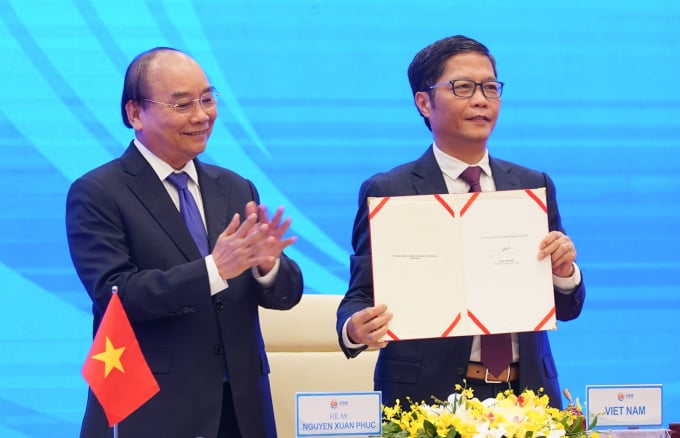May 20, 2025 | 15:43 GMT +7
May 20, 2025 | 15:43 GMT +7
Hotline: 0913.378.918
May 20, 2025 | 15:43 GMT +7
Hotline: 0913.378.918
The Government assigned the Ministry of Agriculture and Rural Development to implement a chapter in the Regional Comprehensive Economic Partnership (RCEP) Agreement and some contents related to copyright of plant varieties and trade of agricultural products.

Vietnam signed the RCEP Agreement in Hanoi in November 2020. Photo: TL.
Standing Deputy Prime Minister Pham Binh Minh has just signed Decision 328/QD-TTg appointing the focal points to implement the Regional Comprehensive Economic Partnership (RCEP) Agreement.
Specifically, the Deputy Prime Minister appointed the Ministry of Industry and Trade to assume the prime responsibility for implementing Chapter 1 - Initial Terms and General Definitions; Chapter 3 - Rules of Origin; Chapter 7- Trade remedies; Chapter 8- Trade in services; Chapter 13 - Competition.
For Chapter 2 - Trade in goods, the Ministry of Industry and Trade is responsible for the contents of import tax of RCEP member countries, general regulations and import and export management; the Ministry of Finance is responsible for the contents of import tax of Vietnam; the Ministry of Agriculture and Rural Development responsible for contents related to agricultural products.
The Ministry of Finance (General Department of Customs) assumes the prime responsibility for implementing Chapter 4 - Customs procedures and Trade Facilitation. The Ministry of Agriculture and Rural Development shall assume the prime responsibility for implementing Chapter 5 - Food safety and phytosanitary measures.
For Chapter 11 - Intellectual Property, the implementing agencies are the Ministry of Science and Technology (for general issues, contents related to industrial property and enforcement of intellectual property rights); the Ministry of Culture, Sports and Tourism (for content related to copyright and related rights); Ministry of Agriculture and Rural Development (for content related to rights to plant varieties).
The Deputy Prime Minister also appointed focal agencies to receive, exchange information and contact with partner countries; appointing focal points to participate in the Committees for the implementation of the RCEP Agreement.
On January 4, 2022, Standing Deputy Prime Minister Pham Binh Minh also signed Decision No. 01/QD-TTg approving the Plan for the implementation of the RCEP Agreement. In particular, it is required that ministers, heads of ministerial-level agencies, heads of government-attached agencies, chairmen of People's Committees of provinces and centrally-run cities focus on directing, strengthening inspection and urging the implementation of declaring the contents of the Agreement.
The RCEP agreement was signed by 10 ASEAN member countries and 5 ASEAN partner countries, namely China, Japan, South Korea, Australia and New Zealand on November 15, 2020, on the sidelines of the 37th ASEAN Summit chaired by Vietnam.
The RCEP agreement took effect on January 1, 2022, contributing to the multilateralisation of free trade agreements that ASEAN has signed with each previous partner country. This helps to harmonise commitments and regulations, while maximizing economic benefits, especially rules of origin, facilitating trade, contributing to strengthening regional supply chains, serving post-COVID economic recovery.
Translated by Hien Anh

(VAN) Dong Thap farmers attained an average profit margin of 64% during the summer-autumn 2024 crop (first season), while An Giang and Kien Giang farmers followed with 56% and 54%, respectively.

(VAN) As a doctoral student doing research on renewable energy and electrification at Harvard University, the author shares his musings on electricity, nature, and countryside memories.

(VAN) The decree on Extended Producer Responsibility (EPR) ensures transparent management and disbursement of support funds, avoiding the creation of a “give-and-take” mechanism.

(VAN) Hue City rigorously enforces regulations regarding marine fishing and resource exploitation, with a particular emphasis on the monitoring of fishing vessels to prevent illegal, unreported, and unregulated (IUU) fishing.

(VAN) Hanoi People's Committee has issued a plan on reducing greenhouse gas emissions in the waste management sector with 2030 vision.

(VAN) Vietnam's draft amendment to Decree No. 156 proposes a mechanism for medicinal herb farming under forest canopies, linking economic development to population retention and the sustainable protection and development of forests.

(VAN) In reality, many craft village models combined with tourism in Son La have proven effective, bringing significant economic benefits to rural communities.